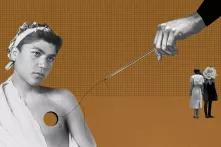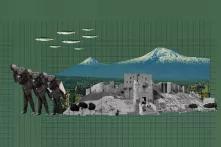Tunisia is often deemed the main success story of the “Arab Spring” after long-term dictator Ben Ali was ousted ten years ago. But in the first contribution of our series “Reminiscence of the future”, Rim Benrjeb writes about a revolutionary spirit that is in danger of falling asleep, patriarchal and state violence, and the impossibility of discussing all of this with one's own father.

It is hard for me to leaf back through the pages of the past with you, father, to revisit the incidents and events that have left scorch marks on my heart.
Twelve years now, and I still haven’t forgotten the day you beat me up outside college, during the demonstration my friend Hossam and I had organized in support of the Palestinians. This was in 2009, following the assault on Gaza. Hundreds of students packed the streets of our remote village, chanting against the Israeli occupation, and then, growing braver and more passionate, against our own police and president. I was leading the march, not so much courageously as recklessly, with a kind of hubris. Adrenaline was my only weapon. I didn’t give a thought to the consequences, to the possibility that I might be expelled from college or imprisoned.
Our slight bodies were seething with rage, swept by passion, and our voices swelled, calling for freedom. Some of us wanted to go back to the college to recruit more students, and as I was trying to persuade the others that we should all stay together, the police arrived, blocking off the area with their vehicles. Unshaken by their threats and batons we stood firm, shoulder to shoulder outside the college.
I never expected to see you pushing through the throng. You slapped my face and swore at me. You kicked me and tore my blue overalls. I didn’t shed a tear and it made you angrier. You grabbed my hair, pulled me to the ground and began to punch me in the head and stomach. A grotesque pantomime that sated the worst instincts of the police and pierced the hearts of my powerless friends.
The station commander intervened, asked you to stop hitting me. “That’ll do, Rejeb. She won’t do it again…”
Neither of you were prepared for what I said: “Ben Ali’s dogs!”
In disbelief you began to beat me more violently, raining down blows. But even as it was happening, my emotions were conflicting: I felt ashamed, because you were supporting those rabid dogs, but I was also filled with pride, because I, your daughter, had twisted your arm and forced you into direct confrontation with the powers that be. You chose to beat me to protect me from expulsion and prison, but you did not respect my dignity.
My dignity, father, which ever since that day has begun to take shape, to take on meaning.
I kept glancing at my cell phone on the bed. I picked it up. I summoned my strength to call you, then changed my mind. A group of friends and I had decided to produce a podcast series about fear under dictatorship. We believe in the idea that the walls have ears, that just speaking about political issues behind closed doors is some great gamble. A new generation has never lived under a dictator. It knows nothing about these things, doesn’t know what fear means.
I felt disoriented and anxious because you were one of the people whose testimony I had chosen to record.
“Hello? Hi, Papa, how are you?”
“Hello there, my girl. Fine, thank you. And how’s your car? Still too scared to drive it?”
“The roads terrify me. People are crazy.”
“Don’t be frightened. Take it slowly and don’t take risks.”
“I smashed the side mirror. I don’t think I’m cut out for driving.”
“That’s just the learning process.”
Normally, I have no patience for drawn-out preliminaries. I like to get straight to the heart of the matter. But this time I didn’t mind chatting about mechanics and road rules and traffic signals. A whole hour we spent, discussing such matters as the engine’s timing belt (is it made of plastic or metal?), and though neither of us have any real understanding of such knotty questions we squabbled and squawked like chickens. For the thousandth time, you told me about the only car you’ve ever owned, a Renault 17, back in the ‘70s when you were a well-known football player for Olympique du Kef. And for the thousandth time you told me about your friend, king of the mechanics and their spiritual leader: Monsieur Faouzi, who saved generations of vehicles from certain death, pumping fresh blood through their ragged, run-down engines. Suddenly, I broke in:
“Papa. Did you ever feel afraid under Ben Ali?”
“Of course I did. Everyone did. I’d worry about informers whenever I went to the mosque to pray. I’d feel afraid every time I had to renew my membership in the RCD.”
“Afraid, though? Or angry?”
“I don’t know. A blend of both, perhaps. I wanted nothing to do with the ruling party, but the nature of my work meant I had to join.”
My father is retired now. He used to work for the local district authority, what’s known as the motamidiyya: a department of the Ministry of the Interior that administers the district where we lived. He worked directly for the motamid himself, who was in turn answerable to the wali, the regional governor. Pre-revolution, the administrative hierarchy had three main divisions: the province, or wilaya, run by the wali; the district, or motamidiyya, run by the motamid; and the municipality, headed by the mayor, or omda. The motamid had absolute authority in the district; he could intervene as and where he chose without oversight or consequence because he was the state’s representative, its bludgeon. Appointment to the position was dependent first and foremost on loyalty to the ruling party, the Democratic Constitutional Rally or RCD, regardless of the candidate’s administrative competence or ability to implement the state’s developmental policies.
Following the revolution, changes to this system were introduced with the aim of empowering local government. Elected municipal councils began to challenge the authority of the motamid, whose appointment continued to depend on party loyalty and whose powers still made him lord of his district.
My father was a conscientious employee. He spent his working life shielding himself against the temptations of bribery, office politics, and informing, and doing everything in his power to ensure that social welfare went to those who needed it. Though obliged to regularly renew his RCD membership, he loathed the party and its representatives in our village, while they in turn would not have hesitated to make him a pariah if they could, regarding him as an agitator, a pest to be disposed of. They wrote reports saying that he was an Islamist sympathizer, because he went to mosque to pray and bought parsley and spinach from an alleged member of the Nahda Movement; or alternatively, that he was a communist sympathizer, because he played backgammon at a cafe with a leftist history professor.
The demonstrations were their golden opportunity to get rid of him for good, to whisper in the motamid’s ear the shocking news: “Rejeb’s daughter led demonstrations and cursed the regime.” Unfortunately for them, I had persuaded the son of the president of the party’s head office to take part in the demonstration, and he had not only joined us in the streets, he even led some of the chants. My father exploited this fact and they were forced to close the file because the “precious boy” was my fellow conspirator.
But father, you were so rough with me in front of the police, and you still haven’t apologized. During our last call, I found myself unable to talk about this black mark in our history, about the injuries that turned to dark bruises on my skin. You’ve grown old, father, still merry and irascible despite your old age, despite the piety of your seventy years. And I’ve grown older, too. No longer the little girl who cut her hair short, wore revealing skirts, and devoured the storybooks published by the Green Library Series. Whole rivers have run beneath the bridge and now I’m thirty, years in which I’ve known enough failures and frustrations to break my back. I’m no longer the girl who used to run through the fields, steal apricots, knock on neighbors’ doors, and then run away. I’m a woman: my body sags and my breasts hang down; only my wrinkles hold their own. Fear swallows me. Loneliness kills me. No one knocks at my door. I hide my head beneath my pillow so I don’t have to look at the picture of you that hangs on my bedroom wall. Your daughter’s grown and you can’t trample on her dignity any more. You can’t beat her.
The day before I left the village to attend university in Tunis, you gave me a warning. You said things that have stayed stuck in my head to this day. My head, which will explode at any moment. You begged me not to join the student union and asked me to be patient, to wait until you could arrange for me to leave the country and do my politics overseas, beyond the oceans. I wasn’t biddable and sweet and I didn’t take your advice. My friend Asmaa and I would go from department to department to attend meetings of the General Union of Tunisian Students and to assist them in all their initiatives and interventions. I’d talk politics openly, abusing senior regime figures in the cafes where I’d sit with friends from the opposition. We’d talk of revolution, of overturning the status quo, of marching in public with our faces uncovered. The generation of bloggers had made great progress against censorship on the internet, and I was in awe of their courage, their integrity, and their solidarity in the face of our common enemy. How can we ever forget their Facebook campaigns, such as A Bad Day for the Censor (#Nhar3la3ammar), Leave Us Alone (#SayebSale7), and A Letter to a Deputy (#RisalaIlaNa2ib)? We will never forget Zouhair Yahyaoui, the blogger who died from torture in the prisons of Ben Ali’s Tunisia, nor blogger Lina Ben Mhenni, an icon of the struggle for freedom who departed this life not even one year ago.
Why did you never hold my hand and tell me to stay the course, that I mustn’t fear a thing? Why did you never hold me close, father? Not once?
Is Tunisia a republic, a monarchy, a zoo, or a prison? This was a headline published on Zouhair’s blog in the wake of Ben Ali’s 2002 referendum on constitutional reform and extension of his term in office. A decade after the revolution, bitter and furious, we are still asking the same questions, and the answer is always the same: Tunisia is a playground for the corrupt and dishonest, for authoritarians and morons. Tunisia is a vast prison for women, young people and children, the queer community, the disabled, and citizens with darker skin. We are strangers in our own land; we no longer feel we belong. Our country does not resemble us; it looks nothing like the dreams that accompanied its creation. Everything around us drives us to leave. Ten years after the revolution for freedom and national dignity, we continue to live in poverty and misery and contemplate suicide, overwhelmed by a general, widespread depression that has rotted our souls and seared our skins. We exist inside a troubled, confused society which tries and condemns anyone who strays from the path of true piety. Our judges are full of rage, our parliamentary deputies bicker and fight, and our president is toothless and hopeless. There are protests and strikes in almost every sector, an economy on the verge of complete collapse, and politics characterized by hostility and violence. We had a revolution to eject the old guard but they’ve returned, strolling into our homes and reoccupying parliament. We had a revolution in which blood was spilled so that we could live with dignity, but all we got was marginalization and poverty. We had a revolution to overturn things and we will do the same again.
Ten years ago we brought down a repressive police state and entered a transition period during which we saw undeniable achievements and suffered disappointments that shook our will. Thanks to economic, social, and cultural circumstances, the rot set in and began to hollow out our revolution. But our hearts continued to beat strong—there were still so many things that required our attention and active resistance. Anniversary celebrations of the revolution became characterless gatherings where tone-deaf speeches and worn-out slogans were declaimed. Last year, the general labor union and a number of civil society organizations issued a call for a rally outside parliament on December 18 to commemorate the tenth anniversary of the revolution and denounce violence in the parliamentary chamber. The Falgatna movement, an organization founded by a new generation of fed-up feminists, was one of the groups calling for participation in the event under the slogan “Let our streets shake their politics.” The crowds, all chanting their own slogans, assembled at the post office in the suburb of Le Bardo, down the street from the parliament buildings. The sight of it came as a shock, one that deepened when the union’s deputy general secretary Samir Cheffi began to deliver his tedious and repetitive speech. I couldn’t believe that, ten years on from the revolution, we were still unable to assemble directly outside parliament. My friend Jawaher and I began to scream hysterically. On the public message board, Jawaher scrawled, “Why are we protesting outside the post office?”
Some of the young people there started to argue with us, so we moved away, joining our comrades at the rear of the crowd who were standing with young men and women from the anti-fascist movement Wrong Generation. We began to chant, “No sermons and no speeches, just rage in the streets,” then decided to split from the main group and walk to parliament ourselves. Halfway there, the police blocked our way. There weren’t enough of us to engage in a direct confrontation—the police numbered in the hundreds—but we refused to be silenced. “A feminist revolution! A queer revolution!” we chanted. “Employment, Freedom, National Dignity!” “Equality! Struggle is the solution!” “ACAB!” “Equality! For women and the provinces!” “You citizens, always oppressed, abuse and hunger are on the rise!” “Down with reactionaries and occupiers!” “No need for panic, never fear, the streets belong to the people!” “The people want the fall of the regime!”
I went home, a lump in my throat because we hadn’t been allowed to stand outside parliament. Misery dragged itself around my head until I burst into bitter tears, and I was just looking for an aspirin to take the edge off my headache when the phone rang.
“Hello there, my girl. I’ve been waiting. I thought you said you’d be recording me today.”
“Sorry, Papa, I completely forgot. I was at the demonstration. About that recording… I think I need to listen to what’s inside myself first.”
Author: Rim Benrjeb is a Tunisian journalist and researcher in the field of political science. She is currently editor-in-chief of jeem.me, an online magazine about gender and sexuality, and also writes for online publications such as ma3azef.com and aljumhuriya.net, amongst others.
Translation from Arabic: Robin Moger is a translator of Arabic poetry and prose based in Cape Town, South Africa.
Curation: Sandra Hetzl (* 1980 in Munich) translates literary texts from Arabic, among others by Rasha Abbas, Mohammad Al Attar, Kadhem Khanjar, Bushra al-Maktari, Aref Hamza, Aboud Saeed, Assaf Alassaf and Raif Badawi, and sometimes she writes too. She holds a Masters in Visual Culture Studies from the University of the Arts in Berlin, is the founder of the literary collective 10/11 for contemporary Arabic literature and the mini literature festival Downtown Spandau Medina.
This essay is part of our series "Reminiscence of the future". To commemorate ten years of revolution in North Africa and West Asia, the authors share their hopes, dreams, questions and doubts. The essays indicate how important such personal engagement is in developing political alternatives and what has been achieved despite the violent setbacks.
In addition to the series we also address the ongoing struggle against authoritarian regimes, for human dignity and political reforms in various multimedia projects: For example, our digital scroll story "Giving up has no future" presents three activists from Egypt, Tunisia and Syria who show that the revolutions are going on.


